












Mr R D Knight retired in July 1978 after twenty nine years at the King's School, the last ten as Second Master It would be very difficult to relate everything he has done for the School The usual epitaph is normally written by a third person, but this year Mr Knight kindly allowed usto use the text of hisKing's Day speech and wetherefore leave these selected items from it to remind us of a very special person before, as he himself puts it, he "moves into the oblivion of retirement" The oblivion of retirement he may well move into, butto allof us who knew him there will be no oblivion in our memory
"Whe n I satdown to think about what I should say of the changes in the School since September 1949, thethought came to me that life in the School, any schoo in fact, consists of a set of disciplines There is the most obvious one, discipline of behaviour as seen in the manners and dress, then there are the academic disciplines, followed bythe physical disciplines of games and sports and, in the last evaluation, the spiritual disciplines
The academic discipline I hava been concerned with over these 29 years has been Mathematics The size of the Mathematics Department isperhaps best measured by the numbers studying the subject in the Sixth Form, since lower down the School it is a compulsory subject. When I entered this Schoo in September 1949 there were just six boys studying mathematics in the whole of the Sixth Form In 1977/78 there are 67, of whom 10 are taking Mathematics as a double subject. Next year there will be more.
The staff teaching Maths has also changed drastically. In 1949 there were, indeed, seven members of staff teaching the subject — at some level — but only one of them, myself, a graduate in Mathematics Perhaps this was notsurprising, asRonald Kittermaster, thethen Headmaster, asserted that he expected every member of his staff to be able to teach any subject.
Severa of the staff were, I thought, amateurs in the teaching profession; some were distinguished, some were eccentric Alec Macdonald, himself an 0 V and theauthor of the "History of The King's School", up to 1936, was distinguished in several fields. Sadly he was taken ill and died before theend of my first term in the School In the memoria service held in College Hall, Ronald Kittermaster said of him: " No one in this generation has done so much as he to keep theflag of beauty flying at this School.' He was not theconscientious, efficient schoolmaster; but he was something rarer and more valuable He was able to kindle sparks That is the real gift of the teacher; for thesparks may flare up into great fires that cleanse thewhole of a man's life.
Another great character with this gift to kindle sparks, and who was also onthe Mathematics staff in 1949, was Dan McTurk He was Housemaster of School House, Master in charge of Rugger for severa years, and a keen fisherman He could often be seen onthelower lawn instructing boys in thefine art of fly casting. He died suddenly in 1965, a great schoolmaster much loved by his boys These are just two of my early colleagues here, whoinfluenced memuch, and whom I shall always remember
These 29 years have seen much work done in modernising curricula, and the School has been in theforefront in this field Perhaps I may beallowed to say at this point that, during mytime here the departments which I consider to have grown almost out of recognition, have been theScience departments, the Mathematics and, may I add, the Music departments King's Worcester was one of the first schools in the country to adopt what are generally known as the Nuffield Sciences At the same time perhaps, I may claim to have had something to dowith introducing The New Mathematics
The second interest which Iwas active in, the physical discipline, was the Schoo Boat Club. Just a century ago, in 1878, rowing was started in the School, and bythe time I arrived here a boat club had come into being which in 1949 numbered about 30 boys Wehad four clinker fours, six sculling boats and three tubs. Since 1920 the Master in charge of Rowing had been Sam Strong, an 0 V of Castle House, but in 1949 he handed over to R H F Carlyle Throughout that time, the School's First IV had competed in the Public Schools IVs event at Marlow Regatta, and had managed to get into the final three times but had never won theevent. In fact thefirst trophy ever won by a school crew was in a Novice (then called Maiden) Four event at Derby Regatta in 1950, when our Second IV,which I had coached, brought home a very large (almost indecently large) piece of silver. In 1951 and 1952 Bob Carlyle's First IV won the Marlow Public Schools Fours thus launching school rowing into a very successful decade in four events Unfortunately Bob left in 1954 and until 1958 I ran the Boat Club on my own In '56, '57 and '58 we again won the Marlow School Fours, and our apparent monopoly of the event became rather embarrassing. So with the arrival in 1958 of Messrs Anderton, Stacey and Leonard, all of whom were qualified to help with rowing, we decided to go into VII Is Webought a very old sectional shell from Worcester College for the Blind, built in 1910, patched it up with fibre glass (it was affectionately known as the Old Collapsible) and greatly daring took it into the Public Schools VII Is at Marlow in 1959 It was the most embarrassing race I ever followed W ewere so far behind that we greatly impeded the umpire's launch and the winning crew was almost out of the umpire's sight when it crossed the line But I had made my point; and Ronald Kittermaster agreed that we must have a new VIII He also suggested that weshould build a new boathouse to replace our wooden shacks inconveniently situated in Hilton Road. The piece of land he offered to us, where the derelict cottages at the bottom of Servern Street had been demolished, was an odd shape indeed, and presented many problems Nevertheless on this very irregular polygon I managed to design a boathouse My wife, together with our loyal rowing parents, ran rummage sales, raffles and a Boat Club Fete and raised the necessary £4000, a considerable sum in those far off days And so the Boat House was opened for the 1960 rowing season by Mrs W R Scurfield, mother of our only (at that time) member of Lenader.
By now we had ournew boat, bought out of profits from the Schoo Shop, and took it to Marlow in the Junior VII Is. Before the regatta I promised the Captain of Boats, Peter Martin, that if we won, Iwould take the VIII to Henley in thenext year We won and Idid Iquote from Michae Craze's History of the School:
"Of the 1960 VIII four oarsmen and thecox were in the 1961 VIII that almost won thePrincess Elizabeth Cup at Henly at thefirst attempt They beat Canford from behind bytwo-thirds of a length onWednesday On Thursday they beat Magdalen College School from behind by half a length only In thefinal next day Nautical College, Pangbourne led them bya length at the mile and, though the gap narrowed, Pangbourne held onto win anepic race by a canvas."
The author has given us more credit than was due It was thesemi-final in which we lost to Pangbourne Nevertheless in recognition of our great effort the parents of the crew most generously presented to the Boat Club, the Henly Shield. From 1962 onwards this Shield has acted as thesupreme trophy at the annua School Regatta; it goes to the House scoring most points In 1951 I entered into a long period, 22 years in all, as a Housemaster. There were only two day-boy houses, Chappel and Creighton, and I took over Chappe from Ned Dilks The House was visibly shocked when, onthe first day of term, I appeared to take the House meeting However the House Captain, E. B. James, was kind enough to write in the December issue of the Vigornian: we were surprised not to see Mr Dilks but straight away Mr Knight gave us confidence in the new management He has a mathematician's keen caustic humour and a delightful insight into our hidden foibles.
I gave up Chappel House in order to take over Hoste in September 1958 and we spent 15 happy years there
I well remember the first day of our first term Boarders were arriving in cars at Castle House, at Choir House and at School House throughout the afternoon, but no customers for Hostel. In fact mywife was quite sure that my reputation had scared them all away, and that they had probably decided not to return that term at all They came eventually — most of them onthe last possible trains, arriving just before nine o'clock.
W e introduced a certain amount of democracy but I stil think that benevolent despotism and not a pseudo democracy is the best way to run a house In ourearly days theprincipal vices of our young charges were smoking and anoccasional visit to a pub Hair was worn short, trousers were narrow and shoes were winkle-pickers Every Sunday morning the House went to 10.30 matins in the Cathedral and corpora punishment was not unknown By 1973 smoking was less prevalent and boys of 18 were allowed officially to visit pubs We had passed through a cannabis and LSD period and drugs were no longer quite so fashionable Hair was worn long, trousers were wide and flared and shoes were becoming platformed Frequent weekends were free for boys to go home, for our catchment area had shrunk In 1960 Hostel boys came from as far afield as Newcastle, Kent and Devon In 1973 a very fewcame from the London area and the majority from within 40miles of Worcester, soit was easy for boys to have weekends at home
In 1968 the Second Master, Harry Ferrar, resigned and the Headmaster invited me to take his place I was proud to accept this historic appointment Henry VIII on dissolving the monastery founded theSchool and nominated thefirst Headmaster, called the Master, but thereafter, Statute XXVI vested in the Dean and Chapter the power of appointing both Master and Usher (as the Second Master was then called) The Master himself had to belearned in Latin and Greek, of good character and pious life with a talent for teaching The Usher had to be all those things too, except that heneed not know Greek This was fortunate otherwise I would not have qualified The first of my learned predecessors received a total of £10 per annum Much has changed But the twice yearly meetings of the Cathedra College, of which the Headmaster and I and the King's Scholars are founder members, stil take place, and tie us historically to the past
Throughout my 10 years as Second Master I have been constantly supported by my colleagues, particularly when last year in the Headmaster's absence Iwas Acting Headmaster for six weeks and my wife and Iwere once more in residence on the Green. I have a considerable feeling of affection for them and shall miss them when I go
The School isvery fortunate and you as parents or boys are fortunate inthat we have such an excellent staff Not only s the staff highly qualified by learning and experience, which gives us our excellent academic results, but also they are keen to lead the School in non-academic activities You name it we do it might well be the School motto
And I am quite sure that, with thecontinued support we getfrom ourparents, and the continuing excellent work of our staff, when Peter Curie isstanding here making his farewell speech to your successors in about 15 years time, he toowill beable to speak of the high degrees of excellence of an education for boy or girl at King's Worcester."


Played 12, Won 4, Drawn 1, Lost 7
The season started with a series of defeats partly due to a lack of players, many having to be recruited as last minute substitutes for the First XV However, by half term a squad of about 18 was being maintained, with all players becoming more interested in winning This was due to the fact that places in the 1st X V were becoming available to good 2nd X V players
After losing the first 5 matches we had a win against K E.S Stourbridge and things began to look up. Our remaining 6 games saw us unbeaten in 4 of them, the season ending with an excellent 39-3 win over Bromsgrove
The side was captained by Nick Hodgetts, or when injured, Ian McCarthy, who eventually gained a permanent 1st X V place. They led a team whose strength was principally in the forwards with a pack led by Ralph Pite, ably supported by Peter Jones, who also eventually made the 1st XV grade
Much credit must also go to our new coach, Mr A Hirst, because it s thanks to his perseverance and enthusiasm that we were able to end the season on a high note
N Hodgetts
U16 RUGBY
This season started on a euphoric note with the defeat of a strong Christ College Brecon side, and this success continued through most of the season, being broken only by Wrekin, Warwick and Bromsgrove
The success of the team was due in part to the continual appearance of a keen squad of 30 boys from which, unfortunately, only 15 could be chosen for the weekly match, and due also to the wealth of talent in the side This talent was made particularly clear when 10 boys were chosen to represent the county and when Craig Preston, having played for the West Midlands, was given an England trial, but was tragically ill on the trial date
The mainstay of the side had to be the phenomenal ball winning power of the pack, and with this continual supply, the threequarters were able to run in the tries. Despite this apparent success the side had nothing to show for t at the end of the season, because for the second year running the Worcestershire U16 Cup was dissolved when King's sides had fought their way to the final
A C J Windsor, J C Preston
U15 XV RUGBY
Played 14, Won 4, Drawn 1, Lost 9
One usually expects an improved record from a team which s playing together for the second year, but unfortunately this didn't happen this year
Convincing defeats were suffered at the hands of powerful sides from W.R.G.S., Christ College Brecon, Solihull and Warwick However, if the team had shown more spirit and determination, narrow defeats by Wrekin, Bromsgrove and King's Gloucester would not have occurred
The pack were quite often outweighed by the opposition, but nevertheless the front five did not show the required courage and drive to win a fair share of ball. Edwards and Hannington improved throughout the season but their technique in most phases was not up to standard Bernie, Clifton and Stanton showed promise in the back row but did not have the opportunity to develop fully, due to the lack of ball with which to attack
Hales, playing out of position at scrum half, played extremely well throughout the season, especially considering the amount of bad service he received from his forwards Campling promised much during practices but rarely showed his true ability in matches Blackburn played in many positions behind the pack as wel as occasionally at wing forward He always ran powerfully and was one of the few backs who regularly tackled Westley, at ful back, turned n some outstanding performances especially in counter-attack and quite deservedly represented Worcestershire Under 16 X V on a number of occasions
M.J.R

Played 12, Won 4, Lost 8
As the playing record suggests this was not a good season for the U14 XV Within the team were some good individual players, notably Preston at scrum half, Morgan at flank forward and Fleming at back Although the rest of the team were not lacking in ability there seemed to be a reluctance to get down to some constructive practice to improve performance Tackling was another area which let the team down We were quite capable of playing well with the ball in our hands but due to our lack of size n the forwards the amount of possession we gained was minimal It was therefore inevitable that we would have to do a lot of tackling This some players seemed unable to accept as part of the game, thus some large scores were recorded against us Having said this t must be somewhat disconcerting for a young boy to tackle some of the huge players we came across last season I would therefore hope that it s not long before certain schools discontinue the practice of playing boys who are kept down a year n that same rugby team and instead play them in the correct year for their age This s a completely negative tactic as far as I can see and is beneficia to no-one Whilst everyone likes winning, it is important to remember that physique plays such an important part in rugger at this age.
Wrekin W 6- 3 Malvern College W 6- 3
King Edward's Birmingham W 5- 4 Brecon College W 6- 3 Solihull W 5- 4 Dean Close W 614-214
Once again the Tennis Team had a highly successful season this year, winning every match they played. Although the Team has a comparatively low average age, the standard is as high as it has ever been and I am sure that so long as the enthusiasm of the Team continues,- many other players will be encouraged to play more often and try to find a regular place n the First VI
The first pair of S. Brand and R. Dean, who have been playing for the Team for the past two years, provided a solid foundation, whilst the exciting and consistent play of F Davies and J Sear, the second pair, ensured certain victory n many of the matches There was, however, the odd occasion when the final result was left n the balance until the last ball had been played by the third pair of D Ferguson and R Davies And despite the fact that the latter is only thirteen years of age, he played with the confidence one would expect from a much more experienced player and swung the matches n favour of King's
Last year Mr Bentley criticised the Team for not being "destructively competitive" This year there has been a marked improvement n the players approach to each match and the Team in general has been playing with much more conviction I hope that the Team can repeat or even better this year's results next season, which should be possible considering that the players are al available for selection
S Brand
The school athletics team again suffered from lack of fixtures, gaining moderate success in the only match of the season against Malvern College and WRGS The only athlete to gain any outside success was David Weighell, who won the Worcester Country Trial, was second in the London Club Athletics meeting, and broke the school record in the U17 800 metres
It was noted with some dismay by members of the team that the athletics field was not marked out for use for the second year running, which po doubt accounted somewhat for the lack of fixtures It is to be hoped that in the coming year more fixtures can be arranged in order to give the teams a chance to prove that King's School athletics is not forgotten entirely
C Rashbrook






When the first two games of the season against Wrekin College and the Old Boys Cricket Club were lost by 7 wickets and 139 runs respectively things looked none too promising for the rest of the season However, of the next eight games played, seven resulted n wins for the School, the eighth being a closely contested drawn game with Solihull The successof the team continued into Cricket Week; indeed, t seems that the 1978 season was the most successfu one ever for the School 1st XI Whereas n previous seasons the side had become overawed against senior opposition during Cricket Week, this was certainly not the case last year Although losing to the O.V Association side on the Monday, the team gave a good account of itself On Tuesday a good win was recorded against P L P.'s XI A drawn game against the XL Club on Wednesday could so easily have been another win The highlight of the season occurred on Thursday when the School scored 196-7 to beat the Gentlemen of Worcestershire It was only on Friday that lack of experience showed through when a very tired team were well beaten by the Worcestershire Club and Ground side The season was such a success for three reasons Firstly, the positive and astute captaincy of Neil Sutton, who always led the team by example He expected every effort from all his players and this they were prepared to give Secondly, the batting of Neil Sutton and Andy Townsend, who scored over half the total number of runs scored by the side during the season Thirdly, the remarkable success of the younger players in their first season in the XI In particular, the batting of Stuart Preece and Jeff Spicer, the all round ability of David Hudson and the bowling of John Buckley and Jim Coombs One must also not forget Tim Campion who, in his third and best season, took 32 wickets at 15.84 runs apiece, this including 5 wickets in an innings three times
My congratulations go to all of last season's team It was a pleasure to be associated with the side and to watch such a high standard of cricket being played by a schoolboy team
XI CRICKET 1978
Played 10, Won 2, Drawn 4, Lost 4, Abandoned 2
The results overall were disappointing, but the side was beaten decisively only once With steadier batting the pitcture would have been very different, and Baxter, Hodgetts, Shaw, Searle and Foard all made good contributions at some point in the season The bowling and fielding were of a very high standard, with admirable contributions from Preston, Clifford, Shaw, Hodgetts, Searle and Mcintosh.
Wightman captained the side, with Hodgetts as vice-captain. Our thanks to P. Lynch who scored for us, and to Mr Helliwell, a devoted though frequently frustrated umpire!
Second eleven colours were awarded to Wightman, Hodgetts, Shaw and Preston, and Secretary's colours to Morgan
This was a highly successfu and enjoyable season The team took part in the Worcestershire Youth Cricket League, winning all matches, usually by comfortable margins It must be said that the opposition from some of the smaller village teams was of a poor standard.
The team lost a 20 over match against Cheltenham after being set 121 to win The team made an excellent start scoring 70 off the first 7 overs! Unfortunately, the middle order collapsed and finally ended up just 4 runs short of the target
Nineteen boys represented the team, ten of whom will still be young enough to play next year Obviously one cannot mention each of these boys who contributed to the spirit and enthusiasm of the team However, a few deserve a special mention Jeff Spicer captained the team and was the main run scorer, failing only once during the season Martin Foard and David Hudson always turned in good al round performances Craig Preston, John Shaw and Peter Campling usually managed to tie down the opposing batsmen with accurate bowling Nick Hales kept wicket well in every match Finally, our thanks must go to our loyal scorer, Philip Lynch, who was nearly pressed into action as a player on a number of occasions, when predictable latecomers lived up to their reputation
M.J.R

Results
King's 76 all out Wrekin 77-3 Lost by 7 wickets
O.V.s 224-6 dec King's 85 all out Lost by 139 runs
Brecon 104 all out King's 105-4 Won by 6 wickets
King's 125-7 dec K.E.S Stour 59 all out Won by 66 runs
King's 219-2 dec W.R.G.S 102 all out Won by 117 runs
Bablake 118 all out King's 112-4 Won by 6 wickets
King's 161-8 dec Solihull 160-6 Match drawn Malvern 97 all out King's 98-1 Won by 9 wickets
K.E.S. Birm 97 all out King's 98-2 Won by 8 wickets
Bromsgrove 91 all out King's 95-9 Won by 1 wicket
King's 176-9 dec O.V.s 178-4 Lost by 6 wickets
P.L.P.'sXI 161-6 dec King's 164-5 Won by 5 wickets
XL Club 159-9 dec King's 152-8 Match drawn
Gents 194-5 dec King's 196-7 Won by 3 wickets
C& G 237-4 King's 58 al out Lost by 179 runs
School games Won 7 Lost 1 Drawn 1 Cancelled3 ACC games Won 9 Lost 4 Drawn 2 Cancelled 3
Bowling Averages
Best Bowling J Coombs: 7-26, 5-14
Batting Averages
Best batting A Townsend: 107
This significant date in the club's history was fittingly marked by a number of notable successes. During the first season under the captaincy of R. Hopkins, the Boat Club recorded a total often wins at Regattas and Heads
First IV: Won early in the season at Worcester Head in the senior' B' division This was followed by a very hard won victory at Gloucester Regatta and the highlight of the season was their success at the National Schools Regatta where they won the Fours' Cup
First IV 1977: Stroke M Mack Smith, J White, R Hopkins, H Haydn-Williams
Second IV: Won Worcester Head in thesenior C division and also the Second IV's division at Hereford and Avon Regattas
The junior crews also had a share in the success of the club with the Colts VIII winning at Avon Head, Hereford Regattas, and Tewkesbury Regatta J B Hobson also had a win, sculling at Monmouth Sculler's Head
The second half of the Centenary year was especially memorable even though our record was somewhat modest Mr R D Knight, who had given his support to the club for over twenty years, retired from his position as treasurer and was succeeded by Mr D Anderton This season also saw the arrival of Mr. A. Hirst as a new coach, and he has already made his presence felt in the club.
The First VIII after some limited success at Worcester Regatta, then came second to Kingston R.C. Senior C. They then split up and formed a First IVwhich was successful, winning at Hereford Regatta and Birmingham Regatta.
The Colts with their new coach, rowed consistently well throughout theseason, with their efforts being rewarded by a win at Birmingham Regatta.
The Centenary Year was finally ended with an enjoyable and well organised Schoo Regatta with a high degree of competitiveness and sportsmanship showed, which always makes rowing worthwhile.
Captains 1977/78: R.Hopkins
M MackSmith
Secretaries 1977/78'; H Haydn-Williams
I D McCarthy
T C Lucas

For thefirst time inthehistory of the King's School, a women's crew was entered into an Open Regatta The crew, consisting of Helen Bailey, Sarah Talbot, Hilary Snow and Karin Paton, were always doubtfu of their ability to compete and were not helped by criticism from some male members of the Rowing Club It was clear that the crew did not want to drive itself to peaks of exhaustion but they kept training and produced a very respectable standard of rowing The most important aspect of their rowing was the enthusiasm and spirit displayed by the whole crew, and the enjoyment everyone got from being able to be in a team, out onthe river, and experiencing a great sense of achievement
The climax to the season was in Wales where the crew raced against Llandaff Rowing Club in the final of the Women's Novice Event — the first time they had even had somuch as a crew beside them, let alone race against them As cox/coach it was my job to keep them reasonably calm and advise them as best as I could, but I only succeeded in getting into aworse state then they did They took the race in their stride, but lacked thestrength and power obvious in their opponents However, themargin of loss was only one and half lengths which was a great achievement first time out and a suitable end to a very enjoyable season for all concerned, Finally our thanks must go to Mr Watson for making the trip to Llandaff possible
I.
McCarthy
This was really a season of mixed fortunes The Senior Team found it very difficult to compete on equal terms with other schools, due to the fact that other schools treated swimming as a major sport At the King's School other sports take priority, and therefore many of our best swimmers are unavailable
The success story of the season lies with the Under 16 Team who won nearly all their matches. Their best performance came at theend of the season in the Worcester City Relays Gala They won the Relay Cup in fine style defeating eight other schools
The Senior teams as always swam with a great deal of enthusiasm butwith little success However, I amsure in the future they will have more success.
Senior Swimming Sports
The Sports this year were held in May, rather earlier than usual due to the pressure of examinations W e were fortunate to complete theprogramme before the rain came The trophy winners are listed below:
Senior 100m Freestyle: M Godber, Chappel House, 73.5 sees
Senior 4 x 25m Individual Medley: M Godber, Chappel House, 81.8 sees
Junior U/15 Cup: Hostel House
Intermediate U/16 Cup: School House
Senior Cup: Castle House
Relays Cup: School House
R Westley broke both the U/16 and Senior records for the 25m butterfly
Fourth Form Swimming Sports
Lower Fourth Winners: Lower 4B
Upper Fourth Winners: Upper 4B
Notable performances were by Guess of U4A who won three individual events and by McMurray of L4B who won two individual events
B A Bamford
Last year saw a surprisingly successfu season, despite a few initial difficulties while the composition of the team was still uncertain Good team spirit, though, soon overcame such problems and the last four matches contained three victories and a draw This is all the better when it is remembered that most of our opponents play competitive hockey for two, not one, terms a year The climax of the improvement came with the match against Bredon, in which King's stormed through to a6-2 victory
N Hodgetts, M Annable, and A Townsend formed a very capable attack that scored seventeen goals in seven matches, with trustworthy support coming from N Sutton (captain) and the halves whenever needed J Cowper and P Wood forged a solid defence which kept calm under even the most strenuous pressure, P Wood's never failing boot saving countless situations Neil Sutton and Andrew Townsend were later chosen to represent thecounty at U19 level
There are stil six members of last year's 1st XI left, and using these players as the nucleus of the new side, there isevery hope of an even better season next year
J.C




This was the most enterprising production to have been performed by members of the King's School ably supported by girls from the Grammar School The performance was the brain child of Mr Crow and Mr Diamond and was a dance adaptation of the play by Shakespeareset to Prokofiev's ballet music, 'Romeo and Juliet' All credit was due to the above mentioned members of staff for arranging all the dance movements, with a small amount of help from Mr Hope in the fight scenes At the same time they were able to preserve the acting potential and retain the atmosphere of the music
The leading parts were played by Mark Hanson and Susie Mike, who were capably supported by a large cast of about thirty others The performances were well received by large audiences, of which quite a proportion were members of the general public. The technical side of the production was well managed by Mike Perkins, Dave Mason and Phil Rothwell, apart from one sequence when the music for the folk dance was played instead of that for the minuet However, the rest of the production passed without incident and all concerned were unanimous that it had been well worth the effort Finally, many thanks to the staff and everyone who put so much hard work into it, making this event an enjoyable success for all
Hilary Snow
"IF
(March 10, 11, 12, 1977)
For both Peter Brinsley and myself, the production of these one act plays by Tom Stoppard was the first time that we had become so involved in drama at the School. While serving as director on "If You're Glad I'll be Frank", a seemingly farcical look at the running of the Post Office with philosophical undertones, I also had a very smal part of my own n it The experience was, I feel, immensely rewarding, and there was a great sense of camaradarie within the entire cast. Although all but one of the characters were essentially cameos, they were appealing in their very superficiality For the main part of Gladys, the speaking clock, we enlisted the help of Betty Pedrini from the Convent Schoo and she made a very good 'best' of what was an unquestionably complex character Others in the cast were such stalwarts as Peter Brinsley, Richard Gibbs, Ragnar Farr, Jo McClatchey and Patricia Allen, as well as a couple of new faces n David Renney and Zofia Langner, also from the Convent. Admittedly, there were the usua technical complications, coupled with a somewhat disastrous dress rehearsal, but that must surely have been through a lack of directorial experience on my part I like to think so
"If You're Glad I'll be Frank" served merely as an appetizer, albeit a rather zany one at that, for the more important "After Magritte" This time we were under the direction of Peter Brinsley, and again the Convent School came to our aid in the person of Carmel Campbell It is to the eternal credit of the stagehands and technicians that such a complicated set as a delicate counterweight a lot of awkward furniture could be constructed on the very limited stage in the Old Library The fact that the counterweight fell through the roofing in the 10 minute interval on the first night merely enhanced the quick-fire humour that reigned throughout the play - an attitude evidently shared by the enthusiastic audiences on all three nights Soon after the schoo performances, the play was taken to the Drama Festival at Droitwich's Norbury Theatre, where we did not win, but gained invaluable experience nevertheless
May I take this opportunity, on behalf of Peter Brinsley and myself, of thanking Messrs Peter Diamond, Timothy Crow and David Hope for their endless encouragement and support throughout this and previous dramatic productions My involvement in the theatre at the King's School will continue to be a long cherished memory
It's always difficult in reviewing school productions of any kind to know exactly what sort of standards to apply One is invariably conscious of the fact that such ventures particularly in their preparatory stages, have sound educational objectives and that very frequently for those who have taken part the experience has been exciting, unique and long lasting And yet, for a variety of reasons, we al fee that the preparation is not enough There is a strong desire, a need and even a compulsion to present our efforts in 'performance' Though the audience is usually composed of parents, friends and well wishers who are naturally inclined to suspend their critical judgment, we should not expect them to do so By choosing to demonstrate our corporate effort and talents in such a forum we are in effect offering ourselves willingly to public acclaim or censure Though special conditions inevitably limit the excellence of some productions — the acoustics and geography of College Hall, the extreme youth and inexperience of some actors and so on — we deserve to be considered critically against the highest criteria Given the obvious limitations, does the production reflect the best that can be achieved? Does it project a worthwhile, uplifting, amusing, instinctive theatrica experience? I was once invited to a distinguished public school for the performance of a play which was enthusiastically, and rapturously, received by those who were of the school and thus 'in the know' My response, without this specia knowledge, was no more than lukewarm
The review that follows s more objective than is normally the case n this magazine. It is more than usually adversely critical Those who wish to see a list of names punctuated by a series of advertising cliches are going to be disappointed Those who expect to be instructed as wel as congratulated may not be.
I believe that if I hadn't been told that Britten's music for 'The Little Sweep' was well worth waiting for, I should have been tempted to leave College Hall before I had heard it after suffering first boredom then irritation and embarrassment as the foreparts to the opera unfolded — especially the excruciating rehearsal scene If these were to be glimpses of an opera in rehearsal, what hope was there for the final productions? Was t indeed an opera at al or a (bad) commercia for creme eggs that was being perpetrated on the audience?
In contrast once Paul Trepte had started to galvanise the audience into rehearsing their songs the whole experience took on a new flavour — the music was enjoyable to sing and the enthusiasm of the Fourth Form audience 'leaders' was catching 'Night Song' particularly with its lyrical beauty seemed to inspire al the participants.
In 'The Little Sweep' itself some of the acting was still a bit wooden and static. Rowan came across as convincingly warm and sweet-natured Miss Baggott, perhaps, was not unpleasant and fussy enough to provide an adequate contrast The children (despite difficulties of costume) were not really differentiated n action any more than they were in music and were very often just standing still in a line when singing
Sammy's stature and voice were ideal for the task but it was hard not to notice that he had not a trace of blackness before or worse still, after he had been stuck up the chimney, despite what the words of the song would have us believe
Musically the final opera was exciting and absorbing — as enjoyable to listen to as it had obviously been to the members of the cast Some of it gave the impression of being complex music mastered at great cost to the performer — a satisfying achievement
R.D
Sheets of slate-like drizzle strike the upturned collars of a phalanx; no, not the Greeks, but the descendants of the Mayflower who do not project spears from their ranks but the zoom lenses of assorted Japanese cameras Funnelled into the portals of the Dyson Perrins Museum a stateside voice was heard to murmur the single consonant 'G' Some say that a little known poet from Michigan, suffering from an acute brevity of vision, went even so far as to say "when a man is tired of Worcester, he s tired of life; for there is in Worcester al that life can afford'' It could have been inspired by the delicate gossamer of detergent on the canal, or the rare spectacle of a moving train across the railway bridge It is more likely, however, that he was referring to a particular facet of the 'faithful' city: the porcelian works which has the somewhat dubious honour of having the prefix Worcester Some of the more grotesque pieces of Victorian craftsmanship doubtless appear very 'quaint to the scope of a typically American mentality
Historically speaking, the unsteady course of Worcester through the years has been tarnished by observers such as Nehemiah Wharton, a sergeant in the Earl of Essex's army who, unlike the mawkish Michigan poet, coldly referred to Worcester as ".. so base, so papistical, and aethistical, and abominable, that it resembles Sodom and is the very emblem of Gomorrah, and doubtless it would have been worse than either Algiers or Malta — a very den of thieves and a receptacle for al the hell-hounds n the country — I should have said in the land"
Somewhat unfairly, the city has received a lot of adverse publicity — the great P.R.O in the sky obviously did not consider Worcester worthy of his attention What kind of suicidal urge led to the burial of one of the most infamous tyrant kings under the archaic stone of Worcester Cathedral? I am, of course, referring to King John, whose reputation has not been improved by Erro Flynn and his band of green-clad Hollywood heroes Charles I brought the civil war to Worcester and eventually lost his head about the situation Cromwel stood outside the Cathedral, admired the towering mouldings between the gothic windows and then proceeded to vandalise the interior, using the refectory as a stable Worcester still suffers from this kind of abuse: the stone visage in the nave stares up into the gothic vaulting, following the delicate ribs of stone, intricately carved and decorated and obscured by a large sign with the words 'UB M scaffolding' Not wishing to change the order of things, Worcester has invested in a specia organisation to maintain the image of previous years — the Herefordshire and Worcestershire County Council The Greek Gods had Mount Olympus, the H&WC C has the red-brick mountain at Nunnery Wood In most theologies one usually finds a 'bad guy'; the scapegoat for various social evils, the 'bogey man implanted into the infant mind or the janitor of the great boiler room under the earth In Worcestershire and, it is said, in other parts of the country, we find the 20th century counterpart — the town planner He wields his mighty trident as a thunderbolt of inspiration knocks him off his drawing board "Eureka" he cries and proceeds to convert the intricate network of Medieval cobbled pathways into a one-way system The height of his genius was in the construction of the M5: why have three carriageways? Let's have two, after all it's cheaper that way
Despite the compromise and the short-sightedness of such men as the poet from Michigan, people who live or work in Worcester continue to look on: watching the boat disappear beneath the waves of the River Severn, not noticing the thin nylon tracer that leads from their ankles into the water There remains one question — is the other end attached to the boat?
C M Covins

You say I have turned Like the enemies You've earned
But I can remember All the good things you are and so I ask you please Can I help you find the peace and the star Oh, my friend
What time is this
To trade the handshake for the fist.
Joni Mitchell
The flight — on time and comfortable First impressions are flying over New York dotted with the turquoise spots of swimming pools, the oh so slow immigration officials, and a staggering humidity "N o crying allowed here," grins a customs official at baby Ruth, who has started to moan, and we're through and into the waiting, bearded smile of an exiled Geordie's sing song voice, untainted by its stateside year.
Driving s confused and confusing No-one indicates, and everyone passes everywhere they can find a gap; but we re too tired to care and drive and talk and doze until Philadelphia arrives Noise of crickets fill the night, in tune with the steady hum of air conditioning units W e wilt in the fearsome humidity and the morning finds us n the swimming pool, exposing our white English flesh to the power of a far away sun
Journeys — everywhere - by bus - by car - by train I now know why everyone n the US A seems to have a car; the public transport systems make ours appear the Utopia of transportation. Journeys — Center City and shops and funny traffic lights that work the wrong way round and you can go on red and zillions of signs and overall a hefty dusting of litter Journeys - through slums and ghettos that lay the lie of American richness and promise. Huge open sores of humanity, run down buildings, people likewise, sat on door steps looking no further than the moment, into a world that forgets them except to remind them where they belong.'Journeys — walking in old Georgian Philly, beautiful terraces that remind of London, and trees, trees, trees — Pennsylvania is well named And rich, golden farmland to the west, manicured with typical 'Deutsch thoroughness by a hard working, productive people, who implant their character firmly on the landscape with old-fashioned religiousness — the Amish.
Journeys — Washington D.C., motels and monuments, fine words and fiscal corruption, green grass and beautifu buildings, and museums of staggering variety and interest It was here that we met the North American Indian.
We did not think of the great open plains, the beautiful rolling hills, and winding streams with tangled growth, as "wild". Only to the white man was nature a "wilderness", and only to him was the land infested with "wild" animals and "savage" people. To us it was tame. Earthwas bountiful and we were surrounded with the blessings of the great mystery. Not until the hairy man from the east came and with brutal frenzy heaped injustices upon us and the families we loved was it "wild" for us. When the very animals of the forest began fleeing from his approach, then it was that for us the "wild west " began.
Chief Luther Standing Bear of the Oglala Band of Sioux.
Genocide s still being practised Legislation still grinds through the Congressionalmachine on its way to further strip the Indian's rights and his culture from him. Their reservations, harsh and barren, mountainous and arid (which is why they were given them in the first place), are now discovered to be rich in mineral wealth This of course is no good to the Indian and lega dispossession s in full cry, "for the good of the nation''.
I left Philly and went to California A six day journey by Greyhound, unrelieved by the monotony of the Prairies, impressive because of their size, and finally made interesting by the people I met A few really stand out An unemployed man with his eight year old daughterincredibly poor and incredibly optimistic — life s to be lived, he says, I stopped worrying years ago And he was content The RussianJew who sat next to me for most of the way — grumbling about seeing America Students and foreigners and poor — all forced together into their own unique community, helping each other with children, with baggage, with food, with companionship The grapes of wrath are withered perhaps, but much goodness still remains


TH E VIGORNIAN
Sinc e goin g to press we regret havin g to record the death o f the Rev . E . Thring . Thoug h six weeks ago he was practicall y a stranger to us, hi s short visit to Worceste r o n the occasion o f the Schoo l Re-openin g brough t abou t a connection whic h we little though t woul d so soon be severed Th e School , as a toke n of their deep sorrow for his sudde n death, sent a wreath by the Head-master, wh o represented the Schoo l at the funeral.
®E publish in this, our present number, a
H E followin g Sermo n o n Educatio n was preache d i n Worcester Cathedra l o n Octobe r 2nd, 1887, by the late Rev . E . Thring , Hea d Maste r o f Uppingha m Gramma r Schoo l : — .My vn, 16-17 " Jesus answered them and said, doctrine is not mine, but his that sent me; if any man will do his will, he shall know of the doctrine, whether it be of God."
Al men have to live. Everyday and all day life is doing or not doing, and both are equally important Nay, the not doing is practically even more powerful than the doing, for on the not doing depends all that we might have been, and this passes without notice and cannot be mended Al l have to live Vet how Tcry few even put before their minds deliberately the learning how to live, and the living as their purpose during life Men are always busy in thoughts about gaining this or that which ihey care for—money, pleasure, fame, knowledge—and rarely make it their aim to be themselves great characters, hew pause to enquire how true this is Of all now before mc, who are they that can ask themselves what their thoughts and daydreams were to-day, yesterday, and the days before, and can answer " We thought of how to be men,and how to live, and not of what we could do or gain." It is, indeed, strange that whilst all live, the simple fact of how to live should be so far from men's
minds ; and God's command of " Do my will, and you shall know the doctrine whether it be of God,"be so cast aside. There is only one definition of truth for man What is truth? Truth is to do at the moment what at the moment you know to be right Truth, for Pilate was to let the prisoner go whom a moment before he had pronounced innocent That is truth ; a living, not a knowing ; a doing what each doer at the moment knows ; it is not a mere knowing A truth may be known as knowledge for thousands of years, but until it germinates into living realities in the life of man, it lies like a seed in a seedsman's shop, capable of life, but till it is brought and planted, practically dead. It is possible also to have all knowledge and to do the wrong thing, Men's heads are full of dead truths, their lives lives of active falseness. But granted there are good intentions The little street boy, who is told not to steal, docs not drop the habit of stealing the moment he knows the right ; neither does a natron clear out of its habits-; neither does the world Thousands of years are passed, even when the effort is true, and the progress true, before a truth becomes living in the world It took fifteen hundred years in God's kingdom to stamp the simple idea of law on but one nation. Mcasrrred by this standard—and it is the right standard—what shall be said of Christianity, which is infinite life, unfolding in the infinity of eternity with all the new creations, which an infinity of moving life must create? As yet only three of its germs can in any sense be said to have become part of the common life of mankind, who are called Christian, namely, the nobility of work, the meaning of war as war, and some feeling of brotherhood and helpfulness How long will it be before "love your enemies" is alive as a life in the life of nations? Yet it is known as a bit of knowledge in half a minute ButChristianity till it lives in men's lives is not born In education then we start with this axiom, that "truth is life acting truly at each moment," and that no dead work apart from life is education And this living in of truth implies experience and continuous growth We are not fragments pitched at random on the earth, like broken crockery on a dust heap, but children of light and life, with a history, and a growth, and a life And education is the science of life put in practice It seems strange to have to insist on this plain fact, but it is still more strange that the training of life has been so thrust aside in the practice of mankind, and bits of knowledge put in its place, But God's definition of education is "D o my will and yon shall know."
The will to be done is, it is true, a kind of knowledge But it is not knowledge in the sense of intellectual gains We want new words for these two distinct things The doing can easily be shewn to be different from the knowledge stores. A commander says, " March !" and an army moves to victory There was no intellectual knowledge imparted by the word " march." But the marching called into play obedience, strength, courage, hardihood, any number of powers of life It is theoretically possible that the most ignorant man in the army might during that march live himself into a hero, and be the noblest example of truest life, whereas the cleverest man, and the most great in brain power, might during that march stamp himself-into a coward, and a traitor, and a weak and miserable fool. £This is constantly happening, so that it has almost become an axiom with thoughtful men that cleverness and brain power and knowledge mongering are the mire of the world. This distinction is vital, and until the great chasm that can separate knowledge
from character, brain "force from right action, is clearly seen ami acted on, education must continue to be what it has long been— a scramble without any true method in it Knowledge is simply head-wealth, and is no more living or alive necessarily than a book is alive, or a guinea is alive ; it is the talent which can be given or taken away without altering the man Life then is the subject matter of education, and nothing that lies dead, no store, no accumulation of unused material, belongs to education The distinction between the living and the non-living in man is the pivot on which all true education turns! And life is the subject of Holy Scripture There we shalnind the true principles for training life, and the true explanation of those principles The first recorded action of Holy Scripture sent the problem of education full-grown into the world at once The fall of man, in its barest and simplest form, was a choice offered between love of good and God on the one side, and power through knowledge and the devil on the other And Eve chose the power of devil-knowledge in spite of the open eye and the loving heart and the presence of God, and gratitude for her happiness in that happy world where God was seen in all his works of blessing. She chose knowledge, and set up [he power of devil-knowledge in her heart, ar.d dethroned God. She chose devil-knowledge above all the goodness and the glory aud the truth which were her certainties. From that hour the struggle between love of power and love of good began, and education has been the history of this struggle, and of the means taken by God to restore love of good to the highest place, and make knowledge and the power of knowledge lower than doing truth. Man does not do right because he knows astronomy, or Greek, or any other head power. Instrumental power may be only a great armoury with the devil enthroned there in the midst of the swords of intellect. Our Blessed Lord lays down the other side very simply and clearly when he says, " I thank Thee, O Father, Lord of Heaven and Earth, that Thou hast hidden these things from the wise and prudent, and has revealed them unto babes." The tender, innocent lives of babes in knowledge can do at the moment what at the moment they know to be right Education then has to train life by harmonizing the rival claims of knowledge and love of good, and bringing them into happy union by overthrowing the devil-worship of mere force of brain or hand God has dealt with this fully by command, symbol, and example The Almighty and Allwise began by commanding sacrifice, which was both a symbol and a command, and he put a curse on the earth and man's strength and skill in work Sacrifice, bold of utter self-abasement, even unto death, is the first step to being restored to liberty and life It told of self and the power of self destroyed in order that a higher power might save ; it set a seal of mysterious value on faith in obedience to beneficent power, even when that power commanded death as man had disobeyed when the commands were happiness and life, and the strength of man's intellect,as shown in the fruits of the earth, was cursed This was the first lesson man had to be taught, that his own works and his own skill done in the pride of skill, were accursed The next great lesson was, when the reign of law was established, that the fruits of the earth and man's skill were partially consecrated by the meat-offering of the fruits of the earth being made part of the daily sacrifice in the Tabernacle and Temple service Then after thousands of years came
TH E VIGORNIAN
the final restoration, when Our Blessed Lord and King gives lo man, redeemed in his kingdom of life, his highest "blessing through the consecrated bread and wine ; and the fruits of the earth become footl from heaven, and all man's powers and all his strength and intellect were blessed by God. Example was also given Abraham was called away from the great imperial city of Nimrod's empire, and he anil his race had to lead a wandering life as shepherds The city life was rejected, the shepherd life chosen as the embodiment of true education in its early prime. The cities held the power and the knowledge and the merciless war-power of the great inventive intellects ol the conquerors of those days. The shepherds tents were taken by God to hold the free and simple manhood, and brave, hardy, unambitious integrity of the (|uict doers of right in peace Life had to be trained, and it was trained The world was put to school as shepherds in the first beginning of schools The shepherds were made to feel themselves pilgrims upon earth, and lo break the tics of fixed homes The shepherd life required hardy, out-door habits, and endurance of heat and cold. The shepherd had to be tender and patient, fond of animals, and careful of life Solitude gave the shepherd time for thought ; instead of being a unit in a crowd pushed hither and thidier, he had to think for himself What communings with God ami his own heart in the lone night watches there were, when every star through infinite space cried aloud to the heir of ihe great promise the prophecy of the promised race, as the stars of heaven for multitude and glory What a schoolroom the wilderness was, with its silent spaces, its fountains, its hills, and all the majesty of nanire unsullied and pure • Then the bravery Think what it was to lie alone on the hill-side by the sheepfolds, with the roar of the lion rolling up through the darkness, anil then to see by the dim moonlight the moving terrors of the great shape coming, or think you saw it, and then, like David, like many a shepherd hero, alone in the night, no one to see, no one to help, to step out 10 meet the lion and the bear, and all for the sake of one poor lamb How much might be said Right noble was the shepherd-school of God. The whole after-world is upheld on those mighty pillars of pilgrim feeling, hardy endurance, patient labour, tenderheartedness, thoughtful hours, wilderness freedom, unambitious bravery, home love There is no knowledge hunting in it, but manliness, perfect manliness The knowledge and force power of the great cities are deliberately rejected anil set aside For as yet they were loo dangerous Mankind had first to be trained to live. The history of education must now be passed over until we come to the last period This sketch does not admit of speaking of Egypt, of Moses, of the Wilderness, ol the law, of the kingdom, all of which were experiences in training, which had to be passed through Then Christ came, and the nature of man was to be made perfect in the perfect harmony of all its powers in Christ's kingdom of life But the first great schooling was nothing but character training, the training of the man as a man This was the foundation, and this is the foundation still Later ages have to add to this, but later ages cannot take away one tittle of this reversal of ihe curse of the fall, and the fatal choice of devil-knowledge as the highest aim, without suffering in proportion. But Christ came, and man was to be made perfect in his kingdom of life And once again we have one great type of perfect manhood set up, and a revelation adapted to our busy modern world and all the
problems that the new life in Christ has brought, of which the great question of wages and earnings of work, which has grown out of work having been declared a holy thing by Christ, is the chief So then our Blessed Lord came upon earth as an artizan, and consecrated by doing so city work and the work of the skilled workman for ever The skilled workman becomes the foremost figure in the world when the Lord of Life came into the world as a skilled workman Henceforth all the work of brain or hand done within four walls ranks as highest The skilled workman in a kingdom of life is consecrated Brainwork is hallowed, hand-work is hallowed, the work of trade is hallowed, the work of the student is hallowed A blessing is on all powers of human nature ; none is left out A blessing is on the scholar, on the artist, on the artir.an, on the labourer The blessing, of Abraham and Isaac and Jacob has not Ielt the fields, but it has been enlarged, and has taken in the workshop, the study, and the city But the principles of this education by which Christ blesses mankind are plain First, manliness : a hardy, active obedience of body and mind to do what has to be done Secondly : experience through law Thirdly : knowledge and the power of knowledge obedient to love of good and law and manly life These three are education And nothing is done without manly life The ideal school will work on these lines The ideal school will set itself to produce manly life, to produce obedience to law, to produce knowledge obedient to love of good Manly life is as different from mere knowledge as a merchant is different from his warehouse, and a miser is different from his gold. The curse of the fall is the worship of knowledge power, purchased by the sacrifice of true life and love of God. The life of Abraham, Isaac, and Jacob, and Moses was a deliberate rejection of knowledge power, involving in the first instance sacrifice of country, of rank, and settled home, and a throne. God wrote in their lives the first great truth of education, that before and above all things education trains true men. And education deals rightly with every human being, the clever and the stupid, those who have time and those who have not, alike. This is the simplest test. The moment any system drops anyone, it is a false worship, an idolatry. And idolatries, which calmly drop the great majority of mankind, approach very nearly to devil-worship. The ideal school first teaches right life. The ideal school teaches right life through knowledge work to each and all equally. It is impossible even to sketch the ideal school now But it must suffice to say that always and everywhere, in homes, in schools, with teachers, with taught, with parents, with children, one watchword ought to be passed on, that " lo do at the moment wdiat at the moment we know to be right" is truth " Do my will and you shall know." The sole business of education is to train this power Education of ihc higher kind trains this power through teaching knowledge But knowledge, which does not conduce to right life, is a curse, and if sought for itself and by itself at the expense of duty and love of good, becomes devil-worship, and the sin of the fall over again It would take volumes to prove this fully, or lo build up the ideal school But the great fa'cl of God's first training of the world is plain The first i_reat principle of manly life is plain The need of manly life is plain Be then men Abhor the devilworship of the fall ; lake for ever Christ's great definition of all true education, " Do my will, and you shall know the doctrine whether it be of God."

Winter:
The time of darkness. Time of nought. No battles won, For none are fought.
Now snow lies thick upon the ground, And all the roofs are silver crowned. In the fields the air is clear.
And now the time of Spring is come, The birds do sing And bees do hum.
Now in the fields the corn is sown, Arms rock the seed as a babe of their own. And an old man watches it all.
Now the months of Spring drew old, The corn springs up. Tall and gold.
Through each wind and stormy shower, The corn stands high defying the hour, And the old man starts to frown.
And when the shorter days draw on, And leaves are tainted shades of brown, The old man takes up scythe and gown. And starts to reap what was sown. While the morbid sickle threshes. The roots of the corn are burnt to ashes: For all battles are lost.
E. Kemp, LRB






















Cycling down a country lane, The moon as your lamp. Gliding among the silvered trees, Feet floating above a black bottomless ribbon. The wind whips my face and pulls tears from my eyes, warm, salty, cold tears. I slow down.
I hover a yard above the hidden road, my legs ready to propel my hidden steed, to shoot me through the air. The moon with its coating of clouds looks down, its cold light shining on the patchwork of silent silver fields and quiet dark lanes.
Peace and quiet
A tranquil state of mind. Everything seems beautiful. Lying in the sun. Lazy day.
I go my own way, doing what I want.
I carefully take
A brush and enamel
And carefully paint
A miniature figurine. Carefully now.
Touch up the scabbard. Lazy day.
Reading a book.
I always read the Lord of the Rings.
My sister tells me,
If you read that
Much more
You 'II turn into a Hobbit, A little furry creature with slanted eyes. 'Charming', I say. Lazy day.
M. J. Verman



What goes on behind the glass front of the Winslow building remains a secret to many people; science remains mysteriously unfeatured in 'The Vigornian' I A multitude of individual achievements, particularly during A leve Physics 'Investigations', go largely unnoticed. There follows a readily understandable description, we hope, of a smal triumph that occurred in December 1977 — the measurement of the speed of microwaves (A less understandable version is available).
Microwaves are members of the large family of electromagnetic radiation which also includes visible light, radio and X-rays, all of which travel at the same speed The method we used to measure this speed was to send out a pulse of microwaves, at the same time starting a clock, and to stop the clock when the pulse reaches a receiver after travelling a known distance One snag is that the waves travel almost 300,000,000 metres (m) in one second (or 186,000 miles if you prefer), so clearly a stopwatch s not very suitable for experimenta measurements!
In practice a cathode ray oscilloscope (CRO) is used as the clock, as it can detect very short intervals in time, typically fractions of a millionth of a second. The CRO, with suitable electrical inputs, produces a graph-like display on a screen like that of a television An electronic pulse producer is used to switch the transmitter on and off, and give a signal on the CRO at the same time. The receiver is connected to a separate beam of the CRO so that the two pulses can be compared
Setting up the apparatus proved to be more difficult than expected: plugging-in wires in sensible places did not give sensible results. After a few evenings in late 1976 we had managed to send detectable pulses over about a metre (without mirrors), but as the equipment seemed to be rather temperamental t was packed away and left for a year
Returning with new interest, we could not improve on the set-up, so started on the experiment proper, which meant sending the pulses up the laboratory and reflecting them off a distant mirror back to the receiver. The mirror we used was a large metal sheet, and wax lenses were used to produce a parallel beam of microwaves The main problem now was to locate the weak signal after reflection, and to shield the experiment from interference, both the electrical variety and by various persons We can personally verify the saying "Nothing holds up the progress of science so much as the right idea at the wrong time."
By the third day there was definitely a signal being received although it was rather 'fuzzy' The fuzzy signa persisted even when T. D. R. H had been confined to the prep, room, and we eventually discovered that it was due to the vigorous action of the cleaner's broom in the adjacent lab! We finally succeeded in overcoming most problems, and so began to take measurements The distance on the CRO screen between the starts of the two pulses was measured as 2.2 cm, then two meta screens were placed in front of the lenses to give a short path, giving 1.6 cm between the pulses The short path was 2.5 m and the long path 19 m, so the pulse travels 16.5 m n the time corresponding to the 0 6 m difference, in this case 0.06 m of a millionth of a second Using this method cuts out delays from other causes The speed of microwaves is thus the distance divided by the time, giving 2.8x10^ (280,000,000) metres per second W e estimated our maximum error due to inaccurate calibration and measurements to be about 35% This could be improved upon by a keen Physics student, but is nevertheless a most satisfactory result
If you have reached this far — well done We hope this account has given you some idea of what goes on 'up there', though this type of experiment is not an everyday occurrence. Carrying out a long experiment, and eventually succeeding, is one of the most satisfying moments in a Physics course: when we were told that this experiment had not been successfully completed here before, it only added to the sense of achievement. It is always comforting to verify that the fundamental facts which textbooks and teachers preach are correct, since the essence of science is discovery and deduction
R A Williams, P R Skinner

f - • -> Collie to i yy pulse. a® sti.\vt clock " cloc k " * pnodlicef
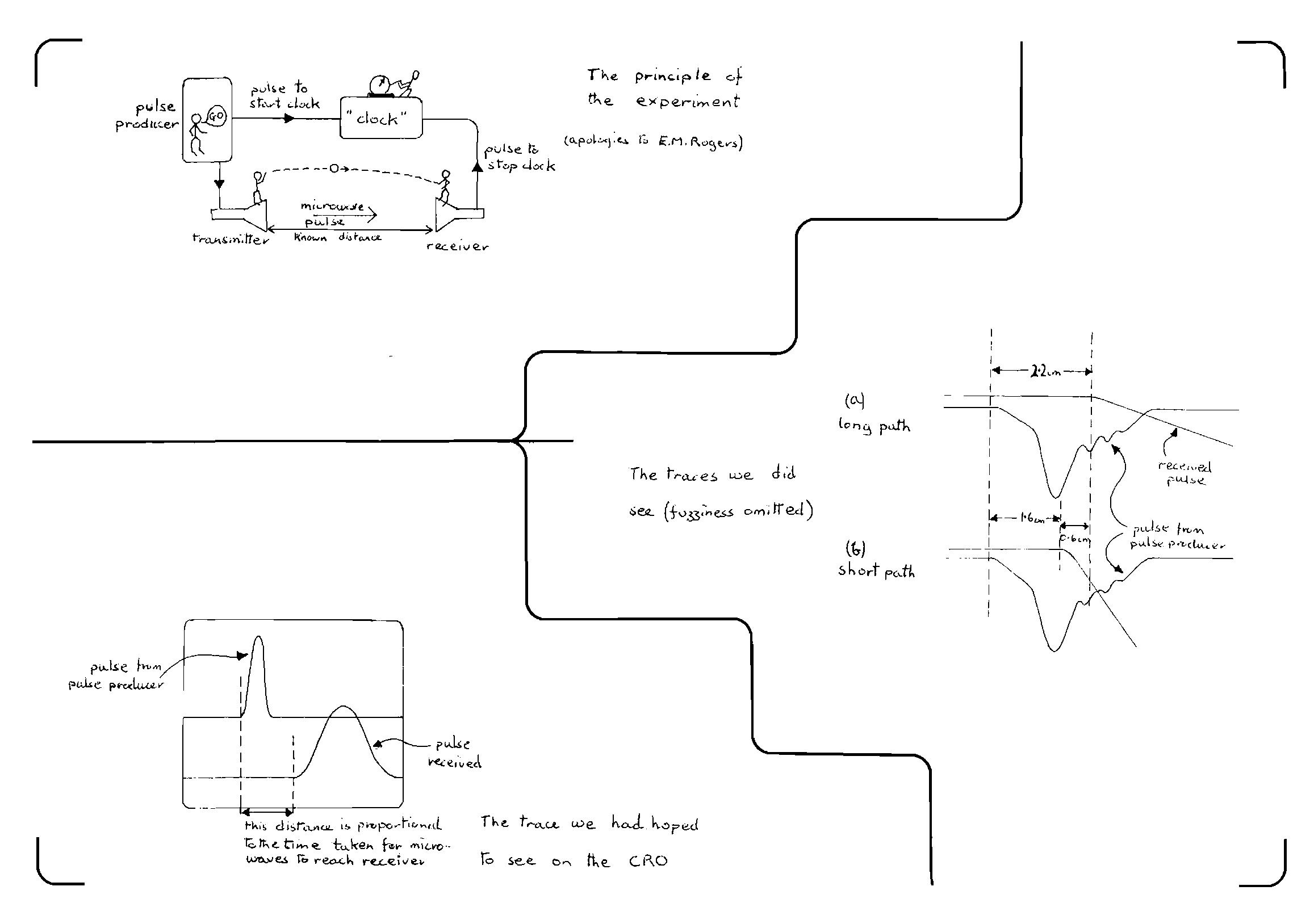
e sto p Uock
TK e tVcurei. "->e, diet
O.V. CLUB OFFICERS AND COMMITTEE
President Chairman
Headmaster
Vice-Presidents
Hon. Treasurer
Hon. Auditor
Hon Secretary
Hon Social Secretary
Chairman Development
O.V.C.C. Rep.
Elected: J P J H R J

A.D Bolland, P.B.E (32-37)
J P Pimley (37-39)
D M Annett(Hon O.V.)
Squadron Leader T Garden (52-62)
T. H. Burgess (44-48)
D T Howell (56-61)
O R Craze(26-30)
J I Wagstaff (52-61)
M R. Craze, T. D. (19-25)
R. T. Padden (46-52)
Campaign P C Underwood (42-47)
W. F. Jones (44-50)
Pimley, S R Coulter (57-66), W G H Cullis (38-41), Folley (33-39), K Papps (43-47), A J Phillips (41-47), Sanders (41-43)
Friday 14 May: O.V Ball in College Hall
Help to make this first Ball for three years a resounding success!
Wednesday 11 July: O.V Valedictory Party to Mr and Mrs Annett in College Hall
Saturday 22 September: 76th O.V. Dinner in College Hall.
The 1978 Dinner was the 75th and it was held in College Hall on Saturday evening, September 23 Over 150 were present They included an Old Choristers' Association table of 28, and these sang a sweet grace It was good to hear men singing Latin in this medieval monastic refectory
) H R Trape the 1977-78 President, was in the Chair and D T Howell, Vice-President,was ViceChairman The High Table guests were the Very Rev R L P Milburn and Mrs Milburn, the Headmaster and Mrs. Annett. Colonel J. A. Gallie (President of the Old Elizabethans' Association)and Mrs. Gallie, Mr. A. G. K. Brown (newly retired headmaster of the Worcester Royal Grammar School) and Mrs. Brown. The headmaster, whose last Dinner in office it was, gave a witty summary of the year at the School, framed as a reply to a hostile article in the New Statesman, a paper which does not like independent schools Dean Milburn was Chairman of the Governors in 1959 and chose David Annett as Headmaster He told us about that, in his speech in reply to the Toast of the Guests; this was a model of learningworn lightly.
The A G.M occupied the hour before the Dinner; some 30 were present A D BollandfS 32-37) was elected President for 1978-79 and I M Chance (CI 55-61) was added to the Committee There were no other changes Warm votes of thanks were passed to J H R Trape for his year's Presidency and to D M Annett for his twenty years Headmastership
O.V.s who wish to go for an outing in an VIII at Henley should assemble at the Boat Tent at 10.30 on the Sunday morning of the Regatta.
E. J. Davies (1910-12) on 17 March 1978 at Houston, Texas. USA. In 1914 he joined the Army as a private soldier in the 2nd South Midland Brigade and was soon commissioned in the 12th Essex Transferring to the R.N.V.R he took part in the famous Zeebrugge Raid on 23 April 1917 He was Vice-President of Davies Associates International and President of the Anglo-American Electrical Co His grandson is J C Davies (S 74-78)
Lt Col. J. C. Flay (DB. 19-24) O.B.E.. LP., at Brixham, Devon in June 1978. John Flay was in the 1924 First XV and a good forward in the early years of the Worcester Club. A keen Territorial, he did yeoman service in the 1939-45 War He was on the O V Club Committee 1938-63 and Club President 1952-57
M. S. Taylor (DB. 18-27) on 13June 1978 in Port of Spain, Trinidad. His widow Muriel (nee Gordon Smith) died on 29 July 1978
Major G H Wilford M.C. T.D (Ca 14-20) in March 1978 Gerald joined the H.A.C in 1922 and was a crack rifle shot At Buckingham Palace on 6 July 1930 he commanded the King's Guard which the H.A.C was called on to provide In the Second World War he served with the K.O.Y.L.I, and won the M.C. in Italy in 1943 and was later wounded. Outstanding at school, he was a loyal O.V. all his life.
D R Armstrong(Cr 70-72) to Miss Claire Francesca Millar at Horsham in August 1978
S J Bundred (Ca 69-74) to Miss Julie Alice Turnbull (Alice Ottley, 67-75) at Malvern on 19 August 1978
S R Coulter (S 57-66) to Miss Susan Valerie Kershaw on 19 August 1978 at Malvern Priory Church
N C Cronin (CI 62-72) to Miss Carol Wignall at Whitbourne on 1July 1978
P J Cummin (Ch 64-69 to Miss Lesley d'Elia at Fairfield, Connecticut, U.S.A on 20 March 1977,
1 N Fearnside (Cr 57-64) to Miss Angela Lynaston at Whitchurch,Shropshire on 29 July 1978
C P Freeman (H 65-72) to Miss Joyce Marie Tee at Glanconwy, North Wales on 29 July 1978
N P. Guilding (CI. 65-68) to Miss Rachel Elizabeth Foster at Fladbury in June 1978.
A. Hammond (H. 62-72) to Miss Linda Turner in Birmingham on 8 July 1978.
C W A Huzzey (Cr 53-63) to Miss Christine Rosemary Ballard at Stoke Prior on 1 October 1977 N Downes (W. 56-63) was best man.
G E Peel (S 64-71) to Miss Jane Roberts at Mold Clwyd on 12 August 1978
P J Rogers (B 59-66) to Miss Judith Weaver at Claines, Worcester on 13 May1978
R J Saunders (CI 54-61) to Miss Pamela Margaret Bullock in Worcester on 3 July 1977
M E Spence (W 63-70) to Miss Julie Mayoss at New St Martin's, Worcester on 29 July 1978
R. H. D. SteelelCl. 61-71) to Miss Rosalind Boughey at Arlington, Sussex on 13Mayl978.
R J Wood (B 62-70) to Miss Caroline Grace Greening at Ombersley on 5 August 1978
D M AstilKCI 55-63) To David and Elisabeth on 8 January 1977 a daughter, Geraldine Victoria, a sister for Samantha Elisabeth
M C Brown (Ch 64-69) To Martin and Mary on 22 June 1978 a son, David Charles
R F Coulter (S 60-64) To Roger and Carolineon 10 March 1977 a daughter, Diana Mary, a sister for Victoria.
M.J England (H 59-66) To Michael and Penelope Ann on 18 July 1978 a son, Paul Thomas, a brother for Andrew Mark
B. M . Foster (CI. 59-64). To Bruce and Penny on 8 July 1978 a daughter, Naomi Clare, a sister for Adam. J M Pettifer (Ca 63-67) To James and Sue on 21 September 1977 a daughter, Julia Amy, Rev. A. C. Swindell (Cr. 59-69). To Anthony and Angela on 15 March 1978 a daughter, Mary Cecilia.

D M Astill (CI 55-63) teaches Biology and Environmental Science at Wombourne and lives in Kidderminster.
C M C Andrews (Ch 63-68) is married and living in Victoria, Australia
Lt. Col.G. D. Bailey, R.E. (43-54) is stationed at Kaduna in Northern Nigeria and advises the new Nigerian Command and Staff College there His three daughters, aged 12, 10 and 6, are in England at school
N Baker (S 70-75) has gained an honours degree in Accountancy at Birmingham Polytechnic and is now with a Wolverhampton firm.
P D Bannister (Ca 51-60) is in charge of the West Midlands District ofNALGO He is married and lives in Bromsgrove.
T M Bardsley (Cr 68-75) graduated in Zoology at New College, Oxford in 1978 and has a research grant for three years from the Medical Research Council
J. W. Barker (W. 64-74) has graduated at King's College, Cambridge and is studying for a Ph.D. at the California Institute of Technology He is engaged to Miss Diana Beck, also of King's College, Cambridge
D Barlow (CI 58-64) is Marketing Manager for Berger Paints, based in Dagenham A new colleague there is M .T. Pel)ew(S. 62-66).
J G Barlow (W 57-67) heads a Firm of Chartered Accountans in Avon and Somerset and has two children, James (4) and Kathryn (2)
R. N. Bayliss (Ca. 63-71) is taking a degree course in Quantity Surveying at Trent Polytechnic.
R W BaylisfCl 56-64) is doing a year's course at London Bible College instead of teaching at St Paul's School
P J Bivand (CI 62-72) has taken the further degree of Master in Business Administration at Manchester University.
R S Bivand (CI 59-68) is a Senior Lecturer in Geography at the University of Poznau in Poland
P. J. Brainch (Ch. 58-65) is Group Projects Executive for Block Hotels in Kenya. He was married in Worcester Cathedral on 15 October 1977
W A G Bridgens (Ch 61-68) is working for Esso at Fawley and lives at Southampton with his wife and two year old daughter
R L Brinsford (CI 54-61) is a Foreign Exchange Banker in the City and has two children, Jamie (6) and Allyson (3) They live in Bishop's Stortford and he administers football over a wide area there
M C Brown (Ch 64-69) is a Civil Engineer on British Rail and lives at Tilehurst, Reading He often sees P. D. Birkenstein (Ch. 64-67), who manages the family business at Uxbridge.
M F Buck (W 57-66) has gained a Ph.D at Reading University and teaches Biology in Cardiff at the Canronian High School
M C Bundred (Ca 71-77) and N G Flower (H 69-77) flew to USAin March and spent 4 months bicycling 6000 miles. Martin's account made delightful reading in Berrow's Journal on 3 August 1978.
S J Bundred (Ca 69-74) graduated as a Mining Engineer in 1977 at Nottingham and is a management trainee at Coventry with the N.C.B
P M Campbell (Ch 65-67) emigrated to Canada in June 1977 and works for the Bank of Nova Scotia His address is Box 2051, Spruce Grove, Alberta
I N W Chambers (H 28-32) is Senior Partner in Hobbs and Chambers, Chartered Surveyors, Auctioneers and Estate Agents, Cirencester. He is also Organist in St. Mary's, Buckland, Berks.
Dr D E Chandler (H 63-67) qualified in 1973 at Manchester, is married and living in Vancouver, Canada, while engaged in post-graduate medical training.
Prebendary W R Chignell (DB 23-25) is President of the Worcestershire County Cricket Club and has had a daffodil named after him by Michael Jefferson-Brown, the Whitbourne expert.
S J Cleobury (Ch 58-67), Sub-Organist of Westminster Abbey, has been made Master of Music at Westminster Cathedral, the first Anglican to hold the Office.
A J Close (S 60-68) works for John Player and Sons in connection with their sponsorship of Games and Grand Prix Racing
C J Collier (S 57-61) is a partner in a firm of Chartered Accountants in Peterborough in which T J Richards (S 65-70) also works
P J Cummin (Ch 64-69) graduated in Horticulture at Bath University, gained a 'Garden Club of America' Interchange Fellowship in Horticulture at the University of Georgia and lives at Boston, USA
S. M . Darlington (CI. 60-70) is now Organist and Master of the Choristers at St. Alban's Cathedral. His brother, J P Darlington (H 64-74) has graduated in Music at Durham and is studying the piano in London at the Royal College of Music
G H D Darwell (S 60-65) is a Systems Analyst with the United Kingdom Atomic Authority at Winfrith, Dorset.
W. S. Davison (W. 59-66) is a Pan American pilot, based at Heathrow, and his brother I. D. (W. 57-67) is a Dental Surgeon in Cape Town, after a spell in Zambia
A I Denison (S 69-74) lives in Chelsea, is involved in Staff Training for Customs and Excise and is an officer in the Army Cadet Force
C H Eames (H 54-60) was second in the Final of the Television 'Master Mind' contest in 1977
N. J. Eaton (Ca. 62-69) added an M. Sc. in Operational Research at Birmingham to his First at Bath and is now a Timber expert with the Council for Scientific and Industrial Research in South Africa at Pretoria
M.J. England (H. 59-66) is a partner in a firm of solicitors at Guildford and is still an active oarsman. A partner in another Guildford firm is T J M Caton (S 61-65)
A M Fegan (S 63-68) is still working in Holland for Fokker-VFW International His address is Warande 14, Nieuw Vennef(N.H.) and telephone 02526 — 6728, ifyou happen to be in the Amsterdam area
J. R. Foley (CI. 64-74) graduated in Law at Durham and is at Gray's Inn.
M R Foley (CI 67-77) is taking the Honours Course in Textile Management at Leeds University
C P Freeman (H 65-72) has graduated in Veterinary Science at Liverpool University
S. A. Gallie (H. 64-67) is in the Police Force in Essex and lives at Stansted.
T N Gazard (Cr 61-67) works for ICI Central Managemetn Services at Wilmslow in Cheshire
T A Grundy (W 61-69) joined the Service Children's Education Authority in 1976 and works at Berlin Middle School. B.F.P.O. 45. He has two sons, Stuart and Kace, and plays rugger.
Dr N A Hallworth (H 56-60) is a General Practitioner at Perranporth, Cornwall and is married with a daughter of 8 and a son of 4
A Hammond (H. 62-72) is a computer control assistant in Allied Breweries at Burton on Trent.
Colonel P F B Hargrave (H 44-52) is Deputy Chief of Staff to the United Nations Forces in Cyprus
M K Harrison (Cr 58-68) gained a B.Sc (Econ) at the London School of Economics in 1971 and is a qualified accountant in Worcester, married, with a daughter Michelle (2)
K. Hastings-Spital (H. 53-59) is the classified advertising manager of the Daily Mail.
T J W Hawkins (Ch 70-74) has graduated in History at Leicester
F. J. Haysman (H. 23-26) assists the incumbents of White Waltham and Shottesbrocke as a Licensed Reader
R. N. Hodes (B. 55-63). F.R. P.S., is a professional photographer and has exhibited extensively. His current documentary study of People At Work is being sponsored by the West Midlands Arts Association.
N H Holden (S 50-58) lives in Wellington New Zealand and works at Chemical Services Laboratories Ltd In 1974-5 he trekked to the Everest Base Camp in Nepal and in 1976 toured the outback of North and Central Australia
D T Howell (S 53-61) is General Manager of the Industrial and Marine Steam Turbine Division of G.E.C Turbine Generators Ltd based at Manchester and Rugby
Dr R C Humphry (Ca 65-70) qualified at St Bartholomew's Hospital in 1977
A R Hunt (Ch 46-55) and E B James (D.B 43-52) work in the Imperial College, London Computer Centre. Roger lives in Stoke D'Abernon near C. B. Reynard (S. 53-58).
N H Hunt (B 60-67), B.Sc., Ph.D (Aston), is the Research Fellow in charge of the medical centre at the Department of Experimental Pathology at the John Curtin School, Canberra, Australia He is married and has a son.
C. W. A. Huzzey(Cr. 53-63) is Production Control Assistant with Deritend Vaccum Castings at Droitwich.
M R Jones (S 68-73) has graduated at Imperial College, London and joined the Army
A J Judd (C 56-60) has begun a post-graduate course in Landscape Gardening at Edinburgh University
M H. Judd (Ch. 63-73) has gained his B. Arch, degree and now has two more practical years before taking his R.I.B.A Part III exams
Dr R M Kirby (Ca 66-72) qualified at Birmingham University in 1977 He is engaged to Miss Jane Morton, an Alice Ottleian
A J Leang (H 64-73) graduated in Music at Cambridge, gained a Diploma in Education at Durham and is teaching in a comprehensive school at Hemel Hempstead
M J Leang (Ca 62-67) is teaching Geography at Latymer School, Edmonton, North London
B. N. T. Leeman (Ca 59-64) is at Sheffield completing a doctorate in Political Science.
M A Lees (Cr 44-55) is a Senior Lecturer in History at Newcastle-on-Tyne Polytechnic and lives at Hexham.

D R Leonard (Ca 47-52) is Deputy Head of Kergrave Hall, Ipswich
Major R J Little (CI 41-45) is at the HQ Engineer Support Group at Woolwich
P. J. Lofthouse (CI. 60-62) is Manager of the Forest Hotel. Dorridge, Solihull.
H S Marshall (CI 54-64) is a solicitor in Cheltenham and has recently married
A Matthews (CI 44-56) lives in Nigeria, has a Swedish address and works for the Scandinavian Airlines
I. Y. Milne (H. 50-55) owns a chain of Instant Print and Copy Shops under the name of Prontaprint and lives in Dorset
W Y Milne (S 51-56) lives in Middlesex and runs his own Computer Software company, specialising in Civil Engineering projects
R W Needham (B 55-62) is an Energy Marketing Engineer with the Midlands Electricity Board at Hereford
1 C Nicholls (B 61-69) is with the Property Services Agency at the Department of the Environment and has gone back to Imperial College to do research on Structural Reliability He is married with one son He reports that D H Bardsley (W 62-69) is working with Ove Arup Partners and living in Chelsea
1 Parkinson (Ca 44-49) is Marketing Manager of Riter Laboratories, an international pharmaceutical group.
R G Payne (CI 61-65) has left the staff of Birkenhead School and is teaching at St Paul's School, Hamilton New Zealand
P L. H. Pearson (S. 55-60) co-ordinates management development for British Steel and liveswith his wife and son in West Sussex
]. M . Pettifer (Ca. 62-67) had his play Bad Dreams in An Old Hotel performed at the Royal Court Theatre in London in February 1978
Ellen Mary Phelips (S. 74-76) is secretary to the Editor of'Municipal Engineering in London.
M Powell (Cr 68-75) graduated in Chemistry at Bath Universityand has started a Ph.D course there
Paul E Preece (S 52-60) is consultant surgeon and senior lecturer in surgery at a medical school in Dundee
Peter S Preece (S 55-63) has come back to the United Kingdom after four years in the Diplomatic Service in Japan
J H Pressdic (DB 35-38) is Manager of the National Westminster Bank at Chichester and sails a Moody 30 from Chichester Harbour
M K. Pye (B. 57-63) is a staff writer on the London Sunday Times. His first book 'The Children of Hollywood' (co-author Lynda Myles Director of the Edinburgh Film Festival) has just been published by Faber and Faber
C R Rayers (Cr 67-74) graduated at Bristol in Computer Science and Mathematics and is working at Reading with Computer Analysts and Programmes Ltd
C. H. Richardson (H. 65-70) was taken seriously ill on the first day of Henley, but has been restored to health by surgery He has our best wishes
J. C. Rogers (S. 51-60) is a Software Manager with I.T.T. Business Systems. He is married, has two children and lives in Kent
M. G. Rogers (W. 56-66). having taken degrees in Electrical Engineering and in Traffic (Transportation) Engineering, is settled in Penarth and works for a local authority His first child, Paul, was born in May
R J Saunders (CI 54-61) is a Chartered Quantity Surveyor and works for Hereford and Worcester County Council.
Rev A C Swindell (Cr 59-69) M.Phil., is Priest-in-charge of Litlington and West Dean and Adult Education Adviser in East Sussex.
D E Seabright(W 55-64) leads a Crusader Bible Class at Nailsea, Bristol He lives at 1, Morgan Hill Close, just off the motorway, and would welcome O.V visitors.
J C Smart (Ca 69-71) obtained an Honours Degree in Nautical Studies at Southampton and is a fully qualified deck officer in the British Merchant Fleet. He sees the world and enjoys it.
G C S Smith (Cr 55-59) went out to Hong Kong last April to take up an appointment in the Crown Lands Survey Office
B J Smith (Ch 52-60) is a partner in Booth and Smith Associates, international food consultants, and lives in Derbyshire
M J Talliss (Cr 69-74) graduated in Civil Engineering at Birmingham and is working for Sir William Halcro Ltd in South Wales.
A W J Taylor (B 67-74) is a pharmacist at Worcester Royal Infirmary
Lieut C J L Thorne (Ca 69-74) is a Troup Commander in an Armoured Division Engineer Regiment He is engaged to Miss Mary Caddie
J R. Tringham (Cr. 56-60) is teaching Mathematics at Dunsmore School, Rugby.
A N Tyson (Cr 67-74) gained a First Class with Distinction in the Cambridge Part II Geography Tripos and has started as a Social Worker in East London. Congratulations on both accounts.
G P Wallis (B 64-74) is engaged in post-graduate research in genetics at Swansea University
C J R White (Ca 71-76) is working for a degree in Fine Art at Leeds Polytechnic
A. G. Williams (Ca. 55-60) has since 1977 been Head of Film Production for the Rank Organisation with HQ at Pinewood Studios
C G Williams (Cr 66-73) graduated in Mathematics at London and is teaching at Brixton in a comprehensive school
D. J. Williams (Cr. 63-70) graduated at Cardiff and is a Production Engineer at London Transport's Engineering HQ Department at Chiswick
D R Winch (B 63-70) took a B Com degree at Liverpool in 1974, qualified as an Accountant in 1977 and practises at Ulverstone (Cumbria). His wife. Janice, graduated at Liverpool in Law and passed her Law Society Part II exams at one go
Rev F B H Woolley (S 56-61) was ordained deacon in Worcester Cathedral on 2 July 1978 and is a curate at Halesowen.
E W Wootten (Cr 41-47) is President of Lucas Industries Inc and lives in Michigan, USA Air Commodore E W Wootten, his brother (Cr 33-36), has retired from the R A.F and is with Hawker Siddeley Dynamics
J B Wright (S 64-68) is a Town Planner working for a local authority and lives in Dorset with his wife and twin three-year-old daughters
P R Johnson (CI 64-71) has qualified as a Chartered Accountant with Peat, Marwick, Mitchell and Co He gained an Upper Second in Physiologyand Biochemistryat Southampton in 1974 and married Sarah Kempsterin 1976.
Incredibly, the Club has been, playing for nearly a third of the centenary years and we are delighted that so many of the early playing members are still connected with the Club. Little wonder about this when one considers the marvellous setting and playing conditions of the New Road playing field which we are so privileged to use
Our playing membership is currently strong, although a sizeable university branch does mean that a constant flow of new young O V s is required to maintain the Club in its present flourishing condition To this end, it is gratifying to find so many boys playing under our name for the under-thirteen and sixteen evening elevens. The under-sixteens were particularly successful in winning the South Worcestershire Championship for the second time in four seasons, and last summer's Oval team should continue in the same vein
Representation in Cricket Association teams was again one of our strong points with Roger Savage in the under-nineteens Peter Wood and Jeff Spicer in the under-sixteens and Duncan Rogers in the underthirteens. Anyaspiring young cricketer will find ample opportunity in these fixtures against other county teams, and also in the weekend coaching sessions that are organised during the winter months
Predictably, we will endeavour to celebrate the Centenary by carryingout some more improvements to the Pavilion. Over the last twelve years it has been possible to add the tea-room and kitchen, shower rooms and lavatory areas and of course the clock Our proposals for 1979 include the resurfacing of the concrete step area and, in conjunction with the O.V Club, some new seating; while we are determined to complete a pair of sightscreens and wicket covers. This work should be marked by a unique occasion at the end of May because we have arranged to play the full United States of America cricket team in a sixty over a side fixture This will be part of their run up to the World Cup
Last season was an outstanding one on the cricket field. Our Second Eleven achieved its best ever record and was well led by David Thomas, while the 1 st XI enjoyed an exceptional run from the end of June to mid-September John Wadley and Peter Petherbridge both batted well and they were an accomplished opening pair. John Wadley broke two Club records by scoring four centuries and scoring a total of runs in excess of 1300
Seven matches were played in a new Worcestershire Border League and we were able to finish well up the table, as in fact we did in the W.C A six-a-side evening competition Our further excursions into league cricket will be on a strictly limited basis; the majority of our games being played on an old-fashioned friendly basis The 18th annual cricket week yielded many runs in some unusually dry weather and the first tour of North Devon was everything a tour should be
After 21 years in office, during which time he successfully arranged about 1500 games for the Club, Bill Jones decided to relinquish the post of Hon Fixture Secretary Fortunately he decided to continue in his other office of Hon Secretary
The other officials are:
Chairman
Captain Hon Treasurer 2nd XI Captain Social Secretary
Committee Members
Press Officer
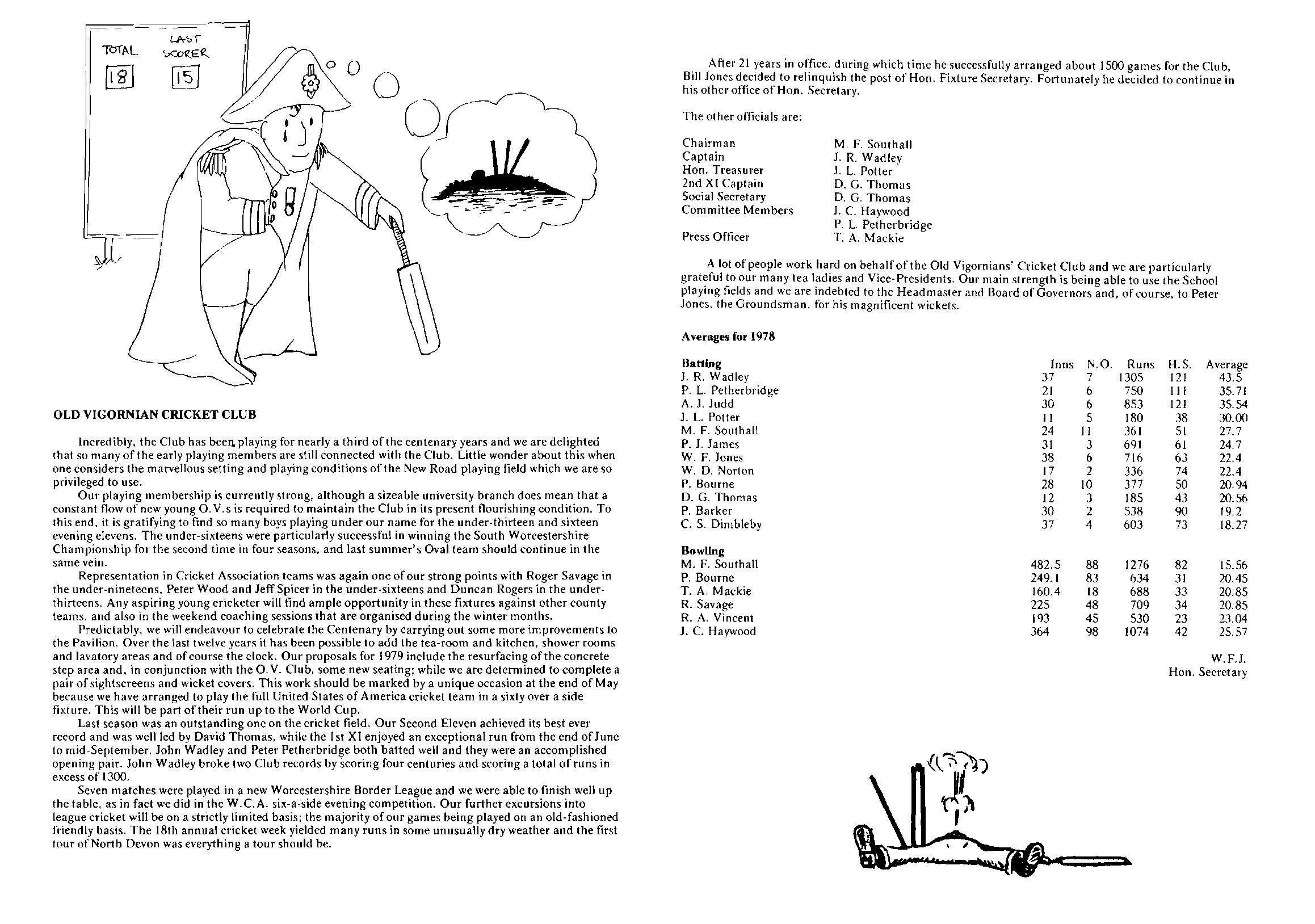
M F Southall
J. R. Wadley
J L Potter
A lot of people work hard on behalf of the Old Vigornians' Cricket Club and we are particularly grateful to our many tea ladies and Vice-Presidents Our main strength is being able to use the School playing fields and we are indebted to the Headmaster and Board of Governors and, of course, to Peter Jones, the Groundsman, for his magnificent wickets
Averages for 1978

The noble game had been played at King's School long before 1880, but in that year the Vigornian magazine recorded the first season of organised cricket One hundred years of cricket is a fine achievement for any school or club, and we are particularly fortunate that so many of the early matches are recorded in detail.
A full history of King's School cricket has been recorded in Michael Craze's history, and the following notes are additional and intended for statistical reference
1880 First season of organised school cricket at Diglis Throwing the cricket ball won by Little with a throw of 101 x 2 feet. (Which competition continued annually until the start of World War ID.
1882 First season of cricket at the present playing field in New Road, although then a much smaller area.
1884 Fixture played between 'Past and Present' and this was certainly the forerunner of the many School versus Old Vigornian encounters to come The match was drawn; the then Cathedral School being 143 all out and the Past XI reaching 76 for 6 wickets by close of play
1889 First game played between School and the O.V.s, with the result being a win for the latter by 9 runs. Sgt. H. Baines was the school professional and he scored 38 for the School versus Hallow In a first class fixture he took 6 M.C.C wickets for 75 runs whilst playing for Worcestershire
1893 A match was played against Hereford Cathedral School without one master on either side This was the first recorded instance, and was repeated against the O V s The Headmaster, Rev W E Bolland, headed the School 1st XI batting averages with an average of 22
1901 R E Foster scored 128 against the School while playing for Malvern Cricket Club (Scores Malvern 202, King's School 213-8) In Two years R E Foster was to score a record 287 for England against Australia at Sydney.
1902 Size of playing field now 104x by60x The 'Old Vigornians of Camborne' offered a silver medal to that member of the 1st XI "who shows himselfthe smartest fielder". School 1st XI won 7 matches out of 11 played. First game played between School and London O.V.s.
1903 School 1st XI unbeaten for second year in succession
1905 B G Stevens, after playing for Worcestershire 2nd XI in 1904 while still a member of King's School, kept wicket for Worcestershire against the champion county, Lancashire, in a first class fixture
1906 An O V., C C Dickson, was invited to play for Cambridge in the University match against Oxford but was unable to accept
1909 The fence and ditch separating the two cricket fields waslevelled
1910 Five games of cricket at once were possible on the playing field.
1913 The old pavilion was reported to be in a delapidated condition with rotting floorboards. The lack of sightscreens was deplored
1914 O.V. Club granted £5 towards cost of an O.V. cricket net.
1921 New pavilion opened as a War Memorial to the 82 fallen O.V.s. Three O.V. XIs were fielded against the School to commemorate the day.
1922 O V Club Dinner arranged to coincide with cricket matches for the first time
1925 An O.V., W. L. Shorting, played for Worcestershire and in 10 first class innings scored 86 runs. In 1930 he was to play Hockey for England, scoring twice against Scotland.
1931 Horse and roller sold for £22 New motor roller obtained
1934 D A Hemmings, bowlingleg breaks, took 80 out of the 119 wickets falling to the School bowlers The wickets were taken in only 180 overs
Synopsis of School matches versus O.V.s
1884-1914 37 arranged School won 21, O.V.s10 2 drawn, 1 abandoned, 2 cancelled The highest School score was in 1913 — 232 all out, and the highest O.V score of 228 was made in the same year. The lowest School scores were 46 in 1891 and 1901. Lowest O.V. score was 26 made in 1902
1919-1939 20 arranged School won 8, O.V.s 6 3 drawn, 1 abandoned, 1cancelled, 1 tied These records and outstanding feats were recorded during the years 1880 to 1939.
Most wickets in a school season 1880-1939
D A Hemmings 80 wickets at an average of 8.2 in 1934
I. T. Chamberlain 69 wickets at an average of 8.31 in 1893
R.G.Hall 66 wickets at an average of 10.7 in 1908
C C Dickson 54 wickets in 1903
C.E.Porter 47 wickets at an average of 5.78 in 1927
Most runs in a school season 1880-1939
B G.Stevens 746 runs for an average of 41.44 in 1904
R.G.Hall 549 runs for an average of 36.6 in 1908
R. E. Summers 524 runs for an average of 65.5 in 1934
W. L. Shorting 518 runs for an average of 74 in 1922
A. K. Chaytor 510 runs for an average of 36.43 in 1909
W F R Morgan 498 runs for an average of 45.27 in 1934
C. E. Porter 474 runs for an average of 36.46 in 1927
Centuries for King's School 1880-1939
12 were scored in 1st XI matches: R. G. Hall (2), W. F. R Morgan (2), B. G. Stevens, A. K. Chaytor, R E Summers, C V Paull, W L Shorting, A L C Wintle, C E Porter and C L Garnettone each
The highest individual innings was 132 against Hereford C.S by W L Shorting in 1920
The highest against the O.V.s was 128x by R E Summers in 1934
Centuries for O.V Club in matches with King's School
E. R. Nesfield 118x in 1919
B G.Stevens 132x in 1907
Highest score in one O.V. Club match versus King's School
L P Cooke 145 runs in 1912 99 in first innings, 46 in second
Most wickets in one innings O V Club v King's School fixtures
J Chamberlain 9-18 in 1894
Hat tricks in O.V Club versus King's School matches
R Webb for O.V Club in 1893
Biggest win by King's School
K.E.S Stratford were beaten by an innings and 182 runs in 1902 King's 201-4 dec Stratford 4 all out and 15 all out
Dickson 7 wickets for two runs and five wickets for four runs
Williams 3 wickets for one run and five wickets for six runs.
Heaviest defeat
229 runs against Malvern College in 1909 Scores 243 to 14
Best season for King's School
1934. 15 matches arranged, 11 won, 2 lost (both against clubs), and two cancelled. The period 1940-1979 will be covered in the December 1979 Vigornian.
W.F.J
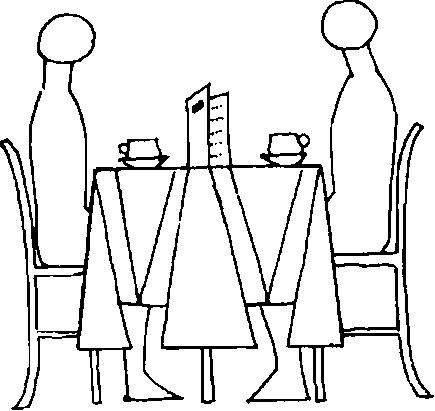
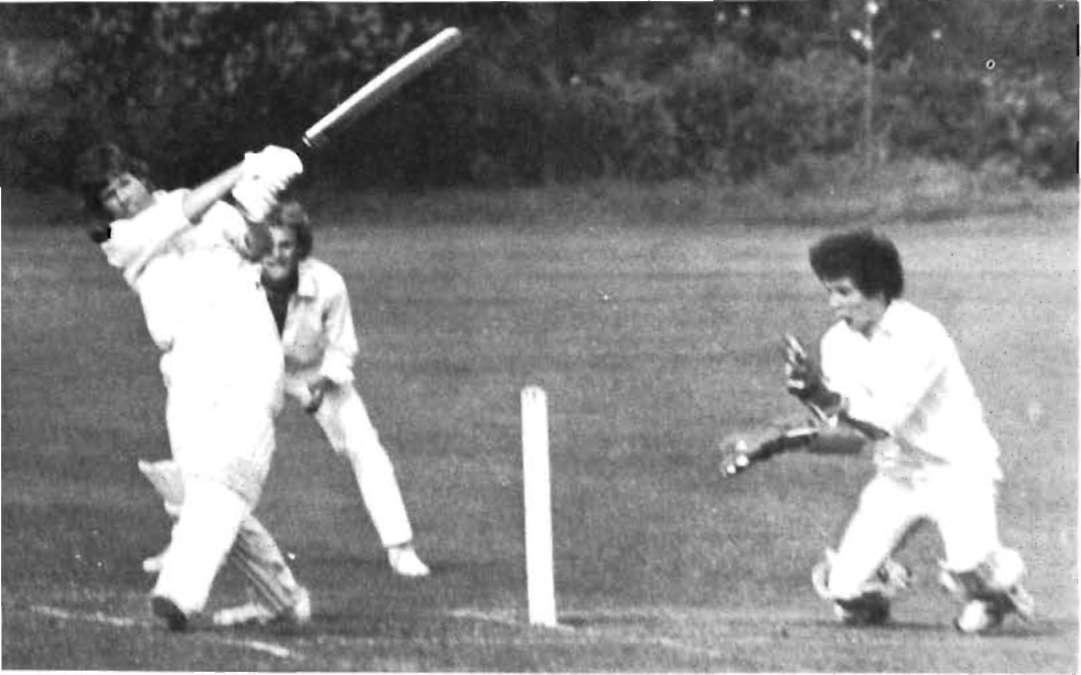



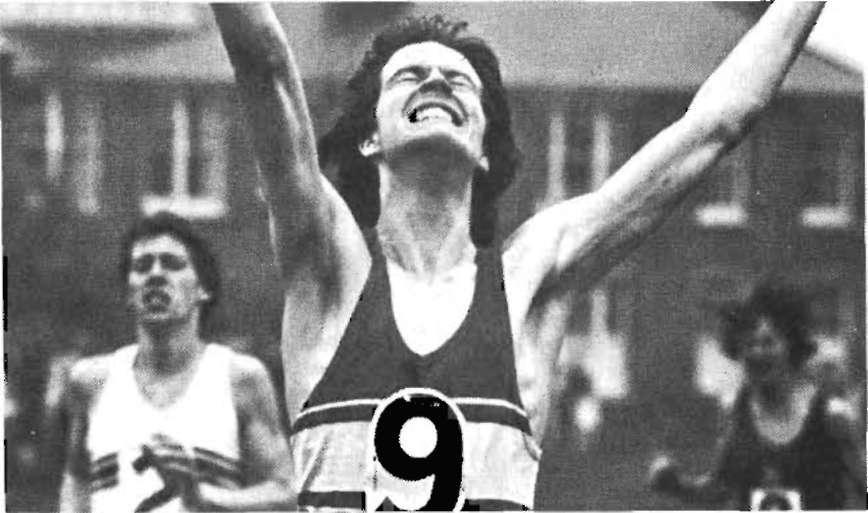







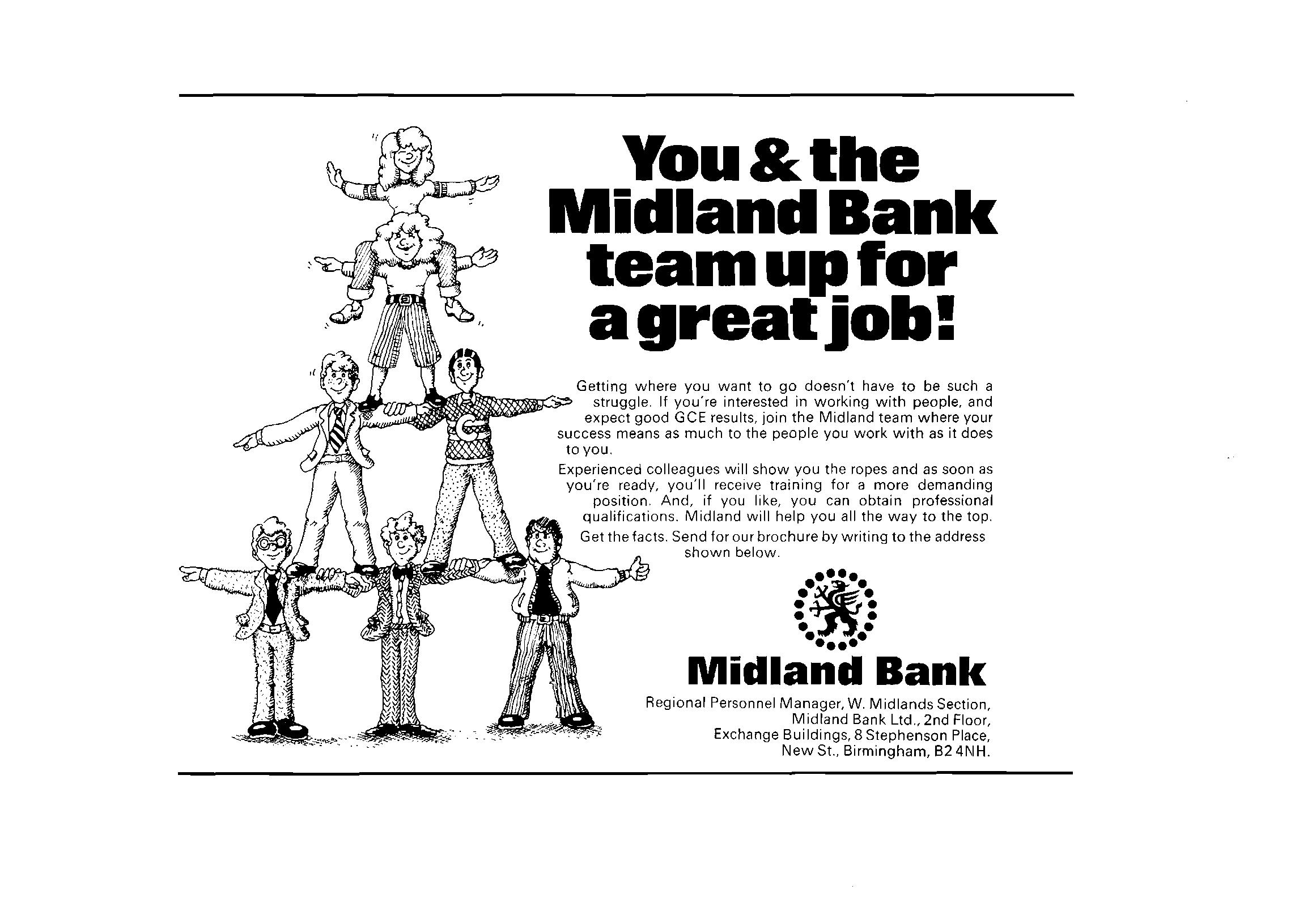
Getting where you want to go doesn't have to be such a struggle If you're interested in working with people, and expect good GC E results, join the Midland team where your success means as much to the people you work with as it does to you.
Experienced colleagues will show you the ropes and as soon as you're ready, you'll receive training for a more demanding position And, if you like, you can obtain professional qualifications. Midland will help you all the way to the top. Get the facts Send for our brochure by writing to the address shown below Midland Bank
Regional Personnel Manager, W Midlands Section, Midland Bank Ltd., 2nd Floor, Exchange Buildings, 8 Stephenson Place, New St., Birmingham, B24NH













A A AA A A A Ik
|[sri8||||| HI ml \ mm mm mm m t* \ mm mm mm S mm SBSS P"